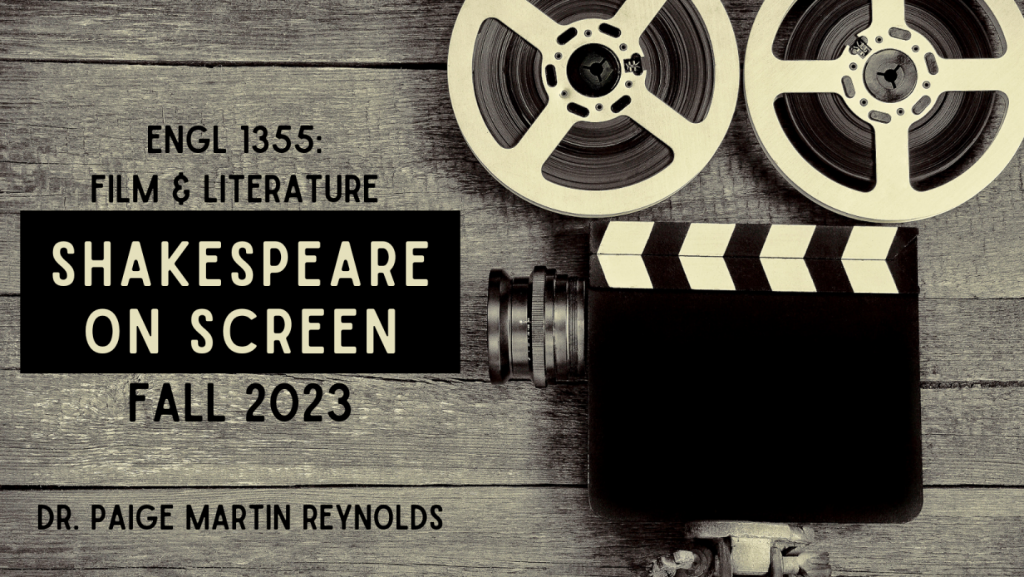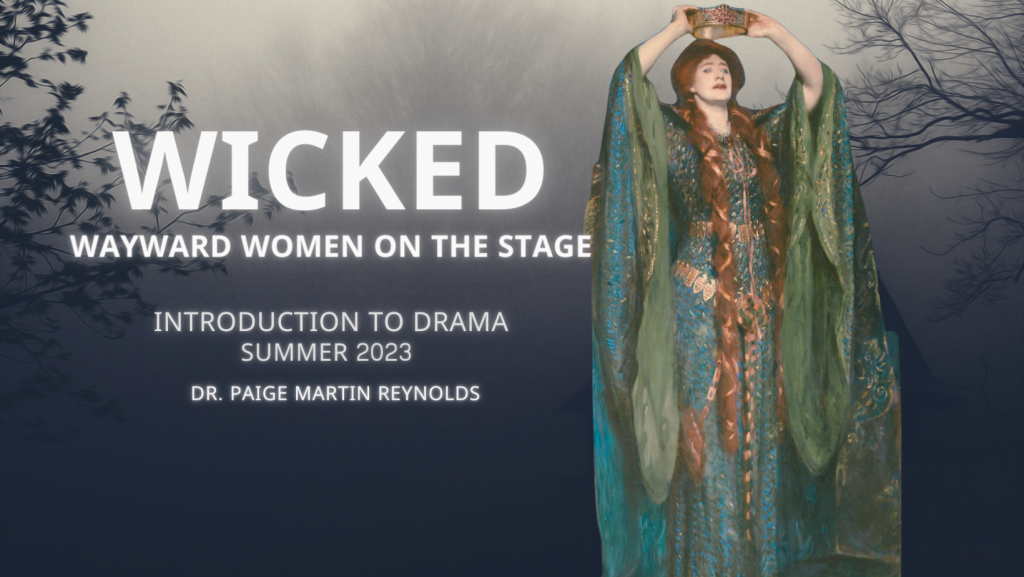ENGL 1355 – Film and Literature – Memory
In this class, we will explore literary and cinematic depictions of memory. Pairing films such as Vertigo, Eternal Sunshine of the Spotless Mind, and In the Mood for Love with literary works from authors ranging from Virginia Woolf to Philip K. Dick, we will examine how filmmakers and authors approach memory – individual, social, and historical – as well as the ways in which cinema challenges and expands notions of narrative and genre; plays with audience perspective and expectation; and presents new ways of telling old stories. We will learn how to “read” films like we do our favorite novels, while simultaneously building a knowledge and understanding of film theory and technique.
ENGL 1355 – Film and Literature – Shakespeare on Screen
In this course, we’ll study some of Shakespeare’s plays on the page and on the screen. We’ll pay attention to the dialogue between different kinds of texts (written, performance, film) and examine the ways in which such texts provide various points of audience access to story, character, and perspective. As we identify our own assumptions about and attitudes toward the works we engage (and how we engage them), we’ll explore the narrative tools available to artists who shape Shakespeare for the screen.
ENGL 1373 – FYS Humanities – The Art  of Being Human
of Being Human
This course is not a chronological study of literature but will be arranged thematically, with a sequential focus on six (6) major themes which poignantly express the hopes and fears, the trials and triumphs, and the joys and sufferings of humans throughout history. Reading assignments will be drawn from a wide range of disciplines in the humanities, including literature, history, philosophy, religion, sociology, and political science. The six themes will be Community & Individualism, Seeking the Divine, Love & Hate, The Quest for Power & Glory, Sin & Redemption, and Mortality.
ENGL 1373 – FYS: Humanities – Vikings, Knights, and Hobbits
In ENGL 1373 Vikings, Knights, and Hobbits, we will read some of the heroic literature of the past that inspired the fiction of J. R. R. Tolkien. While we will use Tolkien’s The Hobbit as a case study, we will explore how Viking tales and the legend of King Arthur’s knights have become the basis of much of the fantasy, science fiction, and superhero/comic book literature in our contemporary age. We will “meet” such characters as Beowulf, Thor, Odin, Loki, Sigurd the Dragon Slayer, Merlin, Sir Gawain, and King Arthur, among others, and we will examine what sort of figures they were in their origins and what they meant to their original audiences. We will read The Hobbit, talk about connections to popular culture, and try to discover why people, as tellers and readers of tales, love these stories and characters so much. While learning active reading, effective writing, collaboration, and thoughtful and creative research skills, you will be encouraged to pursue your curiosity in relation to the subject matter and to create a project that reflects your passions for legendary characters and tales.
ENGL 1373 – FYS: Humanities – The Art of Healing: Literature and Health Sciences
This course will examine issues involved in healing and nurturing one’s community, such as, the power relationship between the patient and the health care professional, the emotional toll of working in the healthcare field, and the experience of illness using the lense of narrative fiction, poetry, and essays. The topics will focus on the frameworks through which healthcare professionals should consider the patients they intend to assist.
ENGL 1373 – FYS: Humanities – American Dreamin’
This class will explore the American Dream through the lens of our culture (books, movies, TV, & music). The American Dream is like so many things in our country—we all have an opinion on it, and those opinions can vary widely. Throughout the semester, we will develop (and re-develop) definitions of the American Dream by looking at (& listening to) a wide range of perspectives on it, including our own. And beyond defining it, these examinations will allow us to rehearse diverse concepts, expressions, and questionings of this thing that sits at the very core of our national identity.
ENGL 2313 – American Literature II – Manifesting America
As today’s society places much cultural capital on manifesting, this course will explore its premises in relation to America’s Manifest Destiny philosophy.
A survey of American Literature from the American Civil War to today, the course will explore various literary trends, genres, themes, and historical and political contexts. This course focuses on a diverse group of authors who represent significant movements of American literature that will, ultimately, help students determine to what extent Western expansion theories manifest themselves today.
ENGL 2319 – English II – Modernism
“Modernism” is a hard movement to define. The difficulty of securing a definitive modernist “style” is confounded by the difficulty in placing the era into a neat historical context. Virginia Woolf famously announced in Mr. Bennett and Mrs, Brown that human nature changed “on or about December 1910.” Critics are much more hesitant to emphatically date the transition to the modernist era, but all agree that it is signaled by rupture. Depending on the criteria one chooses to define the era, modernism’s artistic roots can be traced to Paris of the 1830s, the publication of Zola’s Le roman experimental in 1880, and the work of Walter Pater in the 1870s. Socially, critics alternately cite the Industrial Revolution, Darwin’s theory of evolution, or Nietzsche’s declaration that “God is dead” as the movement’s spiritual beginning. In this class, we will examine a number of key modernist texts, including works from Woolf, Yeats, Kafka, and others. We will approach art and literature as a means of cohering and asserting an individual subjectivity in the face of social, scientific, technological, and artistic change – changes that we are still, perhaps, dealing with today.
ENGL 2312 – American Literature I—Who Reads an American Book?
Sydney Smith, one of the minds behind the Edinburgh Review, asked in 1820, “Who reads an American book?” He could not imagine who would, and here he had a point: books and printed material imported from Europe constituted a large portion of what Americans read (thanks, in part, to a lack of international copyright law until 1891). Even so, our survey of colonial America and the young nation will reveal a robust, diverse literary culture that includes sermons, essays, letters, and autobiographies alongside poetry and fiction. Our approach in this class will work to take into account how individual works of literature fit into the larger print and literary culture of the period, one in which observers were curious about what literary production would look like in a democracy. Because it is a survey course, you should gain a fundamental grounding in American literature of the period. You also should gain enhanced insight into the art of reading, interpreting, and writing about literature more generally.
ENGL 2370 – Introduction to Fiction—Backstabbing, Double-Crossing, and Betrayal in Southern Literature
How does reading stories enable us to inhabit other ways of being? How might reading fiction encourage us to consider who we are, our relationship to others, and our place in the world? How does fiction allow us to approach the question of what it means to be human? Why read fiction? This class offers the opportunity to explore these questions as we read novels and short fiction from the US South with a focus on an experience that tends to elicit strong feelings—betrayal. The stories we read will invite us to consider treachery from a number of angles, making it difficult to arrive at simplistic conclusions. While some of the characters think themselves too clever to be deceived, others are slow to realize that they have been double-crossed. Regardless, many of these characters suffer something awful, while at least one story requires us to consider betrayal—and the suffering that accompanies it—from the perspective of the one who commits the act. All told, our readings should complicate our understanding not only of this deeply human experience but also of some of the various cultures that mark the twentieth- and twenty-first-century South as we work to become better at reading, interpreting, and writing about fiction.
ENGL 2390 – Intro to Drama – Wicked: Wayward Women on the Stage
In this course, we will critically read, discuss, and write about the ways in which drama reflects, represents, and wrestles with complex ideas, emotions, and facets of the human experience. In the process, we will assess how different dramatists use the tools at their disposal to shape plays for different purposes. This semester, we will work to detect cultural assumptions that make it easy to dismiss certain characters as “wicked.” In particular, in what ways do the plays we study participate in conversations about gender and power? What challenges face the female characters we encounter? How might various performance approaches address women on stage who operate outside the bounds of social expectation? In this course, we will explore such questions through close reading, dynamic discussion, performance viewing, and more.
ENGL 2390 – Introduction to Drama – (Silent) Women on Stage
Othello—William Shakespeare
Hedda Gabler—Henrik Ibsen
Trifles—Susan Glaspell
A Streetcar Named Desire—Tennessee Williams
Vinegar Tom—Caryl Churchill
Venus—Suzan-Lori Parks
Machinal—Sophie Treadwell
How have women been portrayed on the stage from Shakespeare to contemporary theater? This course will chart the range of representations of women, the many silences and stereotypes, and the range of portrayals. We will also examine the impact of evolving definitions of gender, economics, and politics on women’s positions in society as evidenced in these plays.
ENGL 3335 – English Language Studies – Diversity in Modern English
What’s the past tense of “stan”? Is “bussin” cultural appropriation? Is the internet ruining language forever?! If you’re curious about these kinds of things, this course is for you! This is not your typical grammar class. We’re not going to talk about comma splices, dangling participles, passive voice, or anything else cheugy like that (unless you want to). Instead, we’re going to look at the rich diversity of English as it is used everyday by real people. We’ll start off with some groundwork on dialects, language change, and cultural attitudes and misconceptions. Then, we’ll apply that groundwork in two units: one on sign languages and another on African American English. You’ll leave the course with tons of nerdy facts and a deeper appreciation for everything English can be.













